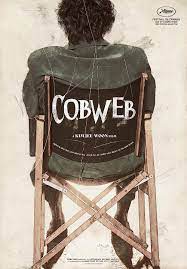
COBWEB
Korea, 2023, 135 minutes, Colour.
Park Jeong-su, Krystal Jung, Oh Jung-se, Lim Soo-jung.
Directed by Jee-woo Kim.
Cobweb is certainly a film for those who have been following the Korean film industry – and, with its 1970s setting, it takes its audience back to the industry of half a century ago, movie styles, movie censorship, showing how things have changed during these decades.
Best to say straight out, this is a comic treatment of its themes. And, very often, it is very broad in its humour (someone remarked that it is slapdash, but the characters and events in Cobweb seem intentionally slapdash). And, it would be fair to say that often the film is quite farcical. The characters, the episodes, the process of making the film, a film within a film…
But, as with topical satire, there are some serious themes underlying the surface comedy.
Audiences, especially with the popularity of the Oscar-winning Parasite, will recognise the star of Cobweb, Park Jeong-su. Here he plays a director who had an initial admired hit but now has a reputation for very ordinary moviemaking. Remembering his celebrity mentor who, literally, went up in flames in his final cinematic achievement, Kim is determined to make a masterpiece. But, his frantic, popping tablets, clashing with the head of the studio, a commanding woman prone to shrill outbursts, getting the support of her niece who might inherit the studio, having weird dreams, getting inspirations to rewrite his script, threatened by the chief censor, cast who offer their own particular difficulties, only two days to complete this masterpiece.
And there is an early scene which has its shot at arrogant film critics who love to savage director-victims. But he is determined to make his masterpiece.
The film he is making is shown in black and white. Colour is for the present.
Which means then that we are moving back and forth, seeing part of the completed film, then the rewrites in production, accidents on set, a recalcitrant pregnant actress, an abusive actor with the director putting on a beard to take his place, the over-wining of the censor, then the arrival of the Minister and trying to make a good impression (and more alcohol), the situation getting ever more awkward.
A decision is made towards the end to film a very complex sequence in one take. We are shown to take but all the manoeuvres needed, shifting the set, stand-in actors, other actors moving out of camera-line… And then the advantage of seeing the scene, the expertise of the one take.
Finally, with the various scenes of the film within the film, we get to understand what it is about, arrogant privileged people, while the the line they have offering to the politicians is that it is definitely anti-Communist!
It seems as though some reviewers would prefer more dignified and polished film – but, it is a satirical farce, some broad comedy, that sends up so many aspects of the film industry.
- Korean filmmaking, the 1970s, the present?
- The film as satire, farce, drama? Comment on film-making, the industry, the personalities, the budgets, censorship, careers?
- The blend of black-and-white photography, the film within the film, the present in colour?
- The focus on the director, his ambitions, his career, his being indebted to his mentor, the conflagration and his death, the director taking the manuscript, his film and its reputation? His subsequent career, considered trashy, the encounter with the film critics and their savaging him, the various comments about film critics and there are attacks throughout the film? His personality, encounters with people, taking the pills, driven?
- The background of the studio, the visuals of the studio, exteriors, interiors and the range of sets? The president of the company, her husband, her control, her tantrums, the issue of censorship and the officials, her absence, working behind her back, her shouting and screaming, apologies, her niece and her role, her change of heart, allowing the production to go ahead, the visit of the Chief, his drinking, observing, her playing up to him?
- The niece, enterprise, her role in the company, taking responsibility, encouraging the director?
- The range of the cast, the lead, his womanising, the young actress, her pregnancy, doubts about paternity? His concern for her, her being sick, tantrums? The older actress and her experience, demands? The veteran playing the mother, her experience? The old man? The hunter, his arguments with the director, drinking, tied up, the director and the beard, taking his place?
- The technicians, the demands made on them, their creativity, the buildup for the single take, the audience seeing it with the movement of the actors, the standings, the dummies, shifts of angles? And then the audience seeing the smoothness of the whole single take?
- The drama in the studio, the director, his dreams, changing his script, wanting a masterpiece, his demands, two days of filming, the various scenes, the response of the cast, the intervention of the censor, his drinking, being tied up and hidden, the tantrums of the cast?
- The plot of the film within the film emerging, the family, betrayals and infidelities, pregnancies, identities, incestuous relationships, consequences? Various scenes, the hunter, the young woman in the trap and her denunciation of men (and the tantrums about her being sleepy, not wanting to do the scene, the niece taking over, the final performance)?
- Critics commenting on the slapdash nature of the film – yet the farcical aspects being slapdash for the purposes of the characterisation and narrative?
- Memories of Korean filmmaking in the past, government control, censorship? The subsequent history? Korean films in the 21st-century?